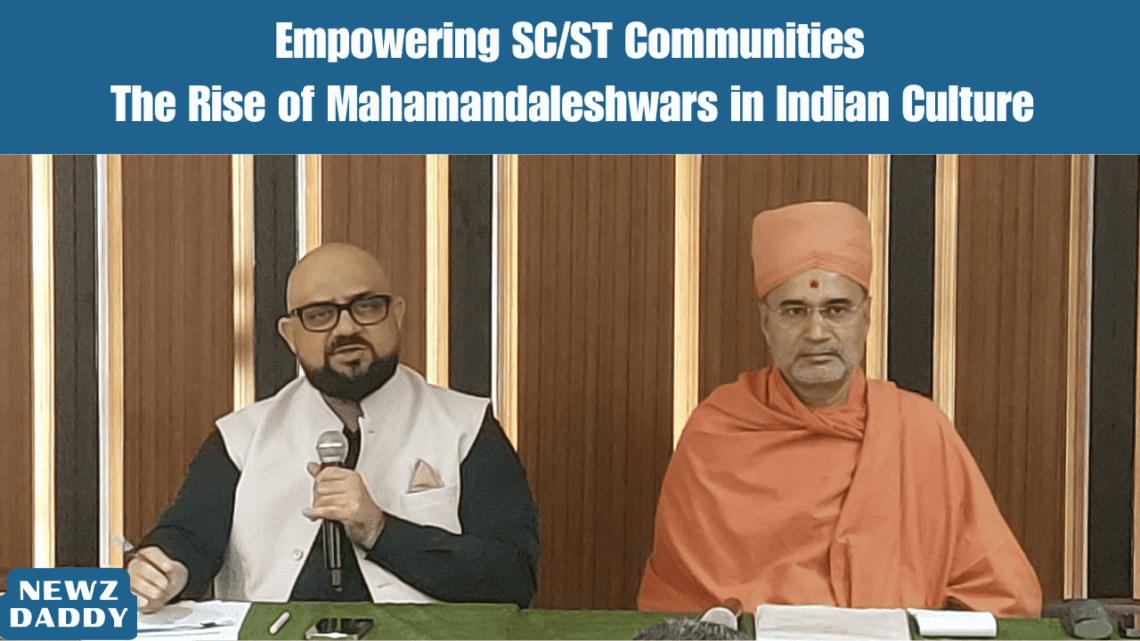Empowering SC/ST Communities. The Rise of Mahamandaleshwars in Indian Culture
Newz Daddy Spirituality Updates
In a significant step towards equality and social justice in Indian society, the Samta Moolak Samaj Ki Sthapana project is poised to reshape age-old traditions, ushering in a more inclusive and empowered future. Led by visionary leaders and esteemed spiritual figures, this initiative marks a pivotal moment in India’s journey towards unity and equality.
The event, scheduled for April 30th, 2024, at Ahmedabad’s Science City, will witness the participation of notable dignitaries, including Smt. Sonal Shah, Shri. Kamal Kumar Ojha, Shri. Jai Shah, Shri. Amar Sable Ji, Shri. Rakesh Sinha Ji, Shri. Gaurav Kulkarni, and other prominent personalities. Their presence underscores the national significance of this transformative initiative.
Leadership and Vision
At the helm of this movement are individuals like Rajesh Shukla, Chief Strategist of National Intellectual Advisory, and Swami Purushottam Shastri Ji Maharaj, Head of Swami Narayan Trust, Gujarat. Their collective vision seeks to break down caste-based barriers and revitalize temples as centres of education, drawing inspiration from ancient educational hubs like Nalanda and Takshashila.
A groundbreaking aspect of this initiative is the historic appointment of SC and ST Sant/Mahatmas as Mahamandaleshwars, symbolizing a departure from centuries-old practices. The Pattabhishek performed by revered spiritual leaders Mahant Ravindrapuri Ji Maharaj and Mahant Harigiri Ji Maharaj signifies a monumental shift towards inclusivity and empowerment.
Significance of the Project
The project’s significance lies in its commitment to upholding the principles of equality and justice advocated by social reformers like Bhim Rao Ambedkar Sahab. By challenging entrenched traditions, it heralds a new era of inclusivity, echoing the ethos of unity and progress enshrined in India’s diverse cultural heritage.
Central to the initiative is the empowerment of SC/ST communities, aiming to integrate them into the mainstream fabric of Sanatan Dharma. Through the motto “Seedhi Baat No Bakwaas,” the project seeks to eliminate discrimination, fostering acceptance and unity within society.
Following the Ahmedabad event, the project plans to extend its reach across various states, including Maharashtra, Andhra Pradesh, Telangana, Karnataka, Tamil Nadu, and Kerala. By engaging with marginalized communities and reuniting them with their cultural roots, the initiative envisions harnessing their potential for national progress and unity.
Constitutional Alignment and Unity
Grounded in the principles of the Indian Constitution, the project embodies the vision of a democratic republic where every individual is entitled to dignity and equality. By dismantling caste-based disparities, it strives to fulfill the constitutional promise of a truly egalitarian society, fostering unity and cohesion.
The project also pays tribute to historical figures from SC/ST communities, such as Maharshi Valmiki, Mata Shabari, Vedvyas, and Maharishi Vidur. This recognition echoes sentiments expressed by national leaders like Hon. Prime Minister Shri Narendra Modi Ji and Shri Amit Shah Ji, emphasizing unity and inclusivity as pillars of a harmonious society.
Embracing Transformation Together
As India embarks on this transformative journey towards equality and inclusivity, initiatives like “Pattabhishekam” stand as beacons of hope and progress. By embracing transformation and unity, we pave the way for a brighter and more harmonious future, where every individual’s contribution is valued and celebrated.
Conclusion
The “Pattabhishekam” initiative exemplifies the spirit of social reform and progress, embodying the collective aspirations of a nation striving for unity, equality, and justice. As we navigate through historical transformations, we stand united in our commitment to building a society that cherishes diversity, empowers every individual, and heralds a new dawn of inclusivity and prosperity for all.



